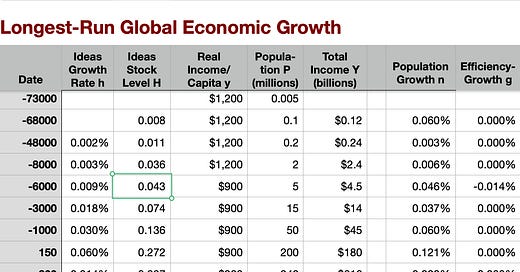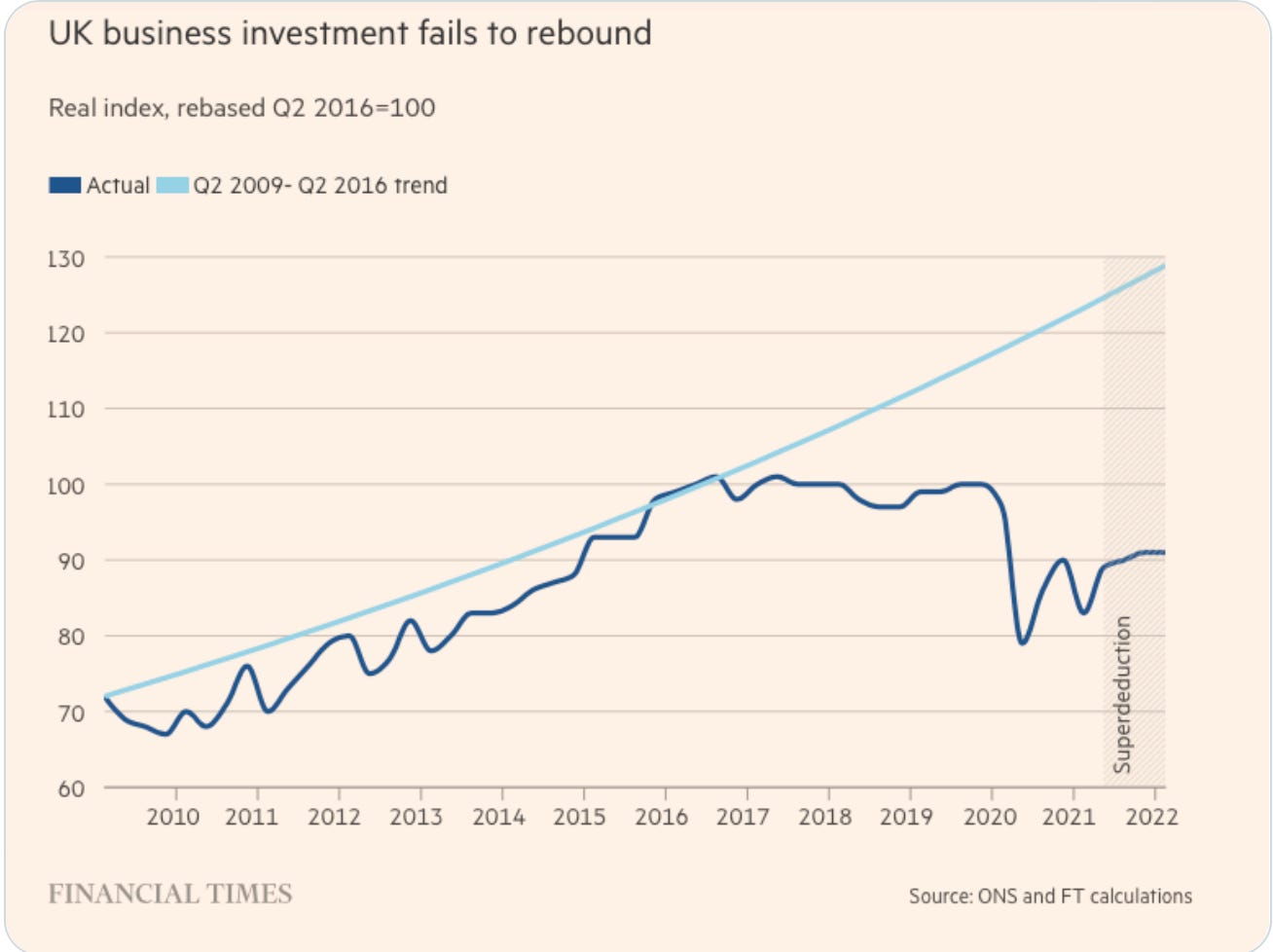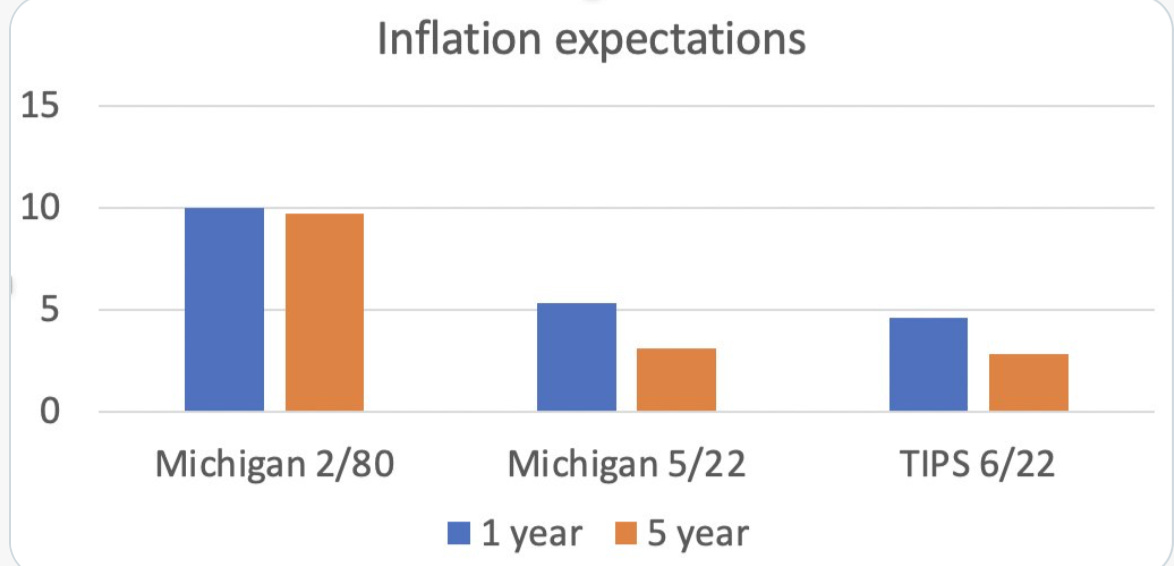Why 20th Century History Was so Different þan All Previous History, &
BRIEFLY NOTED: For 2022-06-26 Su
FIRST: Why 20th Century History Was so Different than All Previous History
Briefly: very very roughly, approximately, and inadequately, on average what twenty workers were needed to do in 1870 with their eyes, fingers, thighs, brains, mouths, and ears, 1 worker was able to do in 2010.
It is also true that what one worker could do in 1870 required 20 in -6000. But that 20-fold amplification was an 8000-year creep rather than a 140-year sprint: a proportional growth rate of 0.04%/year rather than 2.1%/year. And from -6000 to 1870 the overwhelming bulk of the potential benefits for humans from that twentyfold upward creep of technological knowledge had been eaten up by growing resource scarcity: the land and other natural resources available to support 1 person in -6000 had to support 400 by 1870.
By contrast, the twentyfold post-1870 technological-progress wave had to deal not with a 200- but only a 6-fold multiplication of human numbers, leaving lots to be devoted to bringing about much higher average productivity.
Thus over the long 20th century humanity really should have used our collective technological prowess to build a Utopia or Utopias–have created, as my friend Max Singer used to say, a truly human world. Spoiler: it did not do so. But why not? And is there anything we can do to do better in the 21st century? And, if so, what?
If there is one single nugget of insight that I want readers of my book Slouching Towards Utopia <https://bit.ly/3pP3Krk> to permanently engrave on their brains, this is it: around 1870 the rate of technological progress and thus of potential wealth creation went into much higher gear. After 1870, humanity's deployed technological capabilities and thus potential prosperity doubled every thirty-five years—and with it came economic creative destruction that reduced old economic structures to rubble and built new ones, and did it again, and again, and again, every single generation. Before 1870? From 1770-1870 humanity's globally-deployed technological prowess had a doubling time of about 150 years—not 35. From 1500-1770 it had a doubling time of 500 years. And before 1500, we are looking at a doubling time of 2000 years. The difference between our world, in which technological progress creatively destroys and revolutionizes the economy every 35 years, and the world of Agrarian-Age antiquity in which the same proportional changes in technology and economy, and thus in polity and society, take not 35 but 2000 years is, I think, a master force shaping human history.
I want to hammer home the obvious to those who don't have exponential growth magnitudes in their immediate intellectual panoply: a twentyfold amplification of human technological prowess in 140 years is a REALLY BIG F---ING DEAL. To get an equivalent proportional jump in the other direction, you have to go back from 1870 to the Bronze Age— to the year -2000 or so. We are, proportionately, as separate in technology from the railroad's Golden Spike and the first transoceanic cables as those were from the earliest chariots and the sculptor of the dancing girl of Mohenjo-Daro:
One Audio:
Henry Farrell & San Carroll: _Democracy as a Problem-Solving Mechanism <https://www.preposterousuniverse.com/podcast/2021/05/24/148-henry-farrell-on-democracy-as-a-problem-solving-mechanism/>
One Image: The Fruits of BREXIT:
Very Briefly Noted:
Open Letter to the Executive Committee of the American Economic Association: ’The AEA bylaws state the our organization “will take no partisan attitude, nor will it commit its members to any position on practical economic questions.” However… economists who are pregnant or might become pregnant have an equal right to participate in our Annual Meetings without facing disproportionate health risks… <https://pjakiela.github.io/AEA-open-letter-women-2022-06-24.pdf>
John Brunner (1993): Sometimes in the Recent Future…: ‘J. B. S. Haldane… Bertrand Russell and J. D. Bernal… supplied raw material to the science fiction mills for the best part of two generations… <https://www.newscientist.com/article/mg13818683-900/>
Toby Helm & al.: ‘What Have We Done?’: Six Years on, UK Counts the Cost of Brexit: ‘Sectors from fishing to aviation, farming to science report being bogged down in red tape, struggling to recruit staff and racking up losses for the first time… <https://www.theguardian.com/politics/2022/jun/25/what-have-we-done-six-years-on-uk-counts-the-cost-of-brexit?CMP=share_btn_tw>
Daniel Kuehn: _James Buchanan, Gordon Tullock, & the “Radically Irresponsible” One Person, One Vote Decisions… <https://www.cambridge.org/core/journals/journal-of-the-history-of-economic-thought/article/abs/james-buchanan-gordon-tullock-and-the-radically-irresponsible-one-person-one-vote-decisions/154C4E05C5452EAE2E4464E4F94B64DB>
Benji Jones: Summer 2022 Started with a Brutal Heat Wave. Where Do These “Heat Domes” Come From? <https://www.vox.com/energy-and-environment/2022/6/22/23176860/heat-wave-summer-temperatures-climate-change-us-europe>
J.D. Bernal: -The World, the Flesh, & the Devil: An Enquiry into the Future of the Three Enemies of the Rational Soul<https://www.marxists.org/archive/bernal/works/1920s/soul/index.htm>
¶s:
I agree with Claudia here: I simply do not see the expectational wage-price spiral in the making:
Claudia Sahm: It’s 2022, not 1972: ‘The Fed must act to bring inflation down. It is! And it has the full support of the White House and Congress. No guarantees of success. People’s beliefs can change quickly. Feelings matter. And the world has been cruel the past few years. That said, it’s not time to throw in the towel and accept a recession. No!… The Fed’s thinking and actions in the 1970s are not comparable to the current crisis. We have learned many lessons from the past, and it’s clear that Fed officials are applying those lessons as best they can today…
LINK:
Here, for the first time I have seen this year, is a comprehensible argument about how expectations of inflation might get entrenched, and thus generate a wage price spiral which would be best handled by having more aggressive Fed tightening now. Paul Krugman does not believe it. But he does take it seriously. And so do I. The claim that a media-partisan complex is about to brainwash gullible Americans in the interests of clickbait and anti-Biden votes—it seems a big stretch to me. But the world is a stange and surprising place:
Paul Krugman: ‘Crucial: [I am] not claiming that consumers or markets have special information. The question isn’t whether they’re right; it’s whether inflation has gotten entrenched. All the evidence says no. Now, Goldman Sachs is making a curious argument: That inflation expectations will rise because of “the coming barrage of political advertisements highlighting high inflation ahead of the midterm elections”…. CNN has become the Inflation News Network; and what do you think people see on Fox?… If partisan ads get more people to tell pollsters that they expect permanent high inflation, will this translate into actual wage and price increases? That is, will it affect perceptions that inform economic decisions, as opposed to those that might affect voting? Doubtful. We’ll need to watch this, and maybe discount what the surveys—as opposed to financial markets, where people are putting money on the line—say. Key point: the Fed should not slam the brakes because of phantom inflation fears…
LINK:

I confess it has been a long, long time since the New York Times’s decision to keep giving Ross Douthat has column-inches has made any sense to me. Perhaps it is eleven-dimensional chess? That this is the best that a conservative in America in 2022 can do? The key, I think, is that the plutocrats and neofascists in the republican party have discovered that their key to political success is resisting social-democratic proposals to treat people equally by aggressively pushing for a society in which people are classified as unequals and then treated unequally:
Steve M.: Imagine There’s No Revanchism: ‘Once again [Ross] Douthat is digging in the dung pile of the contemporary right, convinced that there must be a compassionate-conservative pony in there somewhere…. Stop snickering. He really believes this. He thinks it’s actually possible that a movement almost monomaniacally devoted to punitive acts will do a 180 and empathetically expand aid to poor parents in the name of conservatism…
LINK: <https://nomoremister.blogspot.com/2022/06/imagine-theres-no-revanchism.html>
And, yes, a better world is possible:
Garrison Lovely: Do We Need a Better Understanding of ‘Progress’?: ‘Cowen and Collison… are not content to merely study progress; they want action…. The progress community wants its followers to believe that they can do better…. For Crawford, the vision of that world animates him: “I want humanity to regain its self-esteem and its ambition, to figuratively and literally reach for the stars. I want us to dream of flying cars, fusion energy, nanotech manufacturing, terraforming planets, exploring the galaxy. So it’s not just about policy, but about people’s fundamental attitudes towards humanity and our place in nature.” If you fell asleep for another 70 years, might Crawford’s world await you? Would you be living a happier, richer life? Perhaps…
LINK: <https://www.bbc.com/future/article/20220615-do-we-need-a-better-understanding-of-progress>











Douthat is very occasionally perceptive to the degree that if he had a Substack, I might take the free tier. He’s not NYT op-ed material any more than I am, or rather, perhaps he is, but in the Brooks-Friedman genre of “wouldn’t it be nice” free-floating speculation untethered to reality.
I continue to be stunned by the bull-headed stupidity of Brexit. I’m not sure the right state for comparison in the US - perhaps Florida, a large state but not the largest, not obviously critical in logistical or resource terms, a large market, true, but not even potentially self-sufficient. How long would it take before it became like other peripheral Caribbean or central American nations?
If I had to pick one thing on “what to do better”, it would be devoting great resources to finding ways to make governance of publicly-owned enterprises effective. It can be done; we even have some in the US that are effective. But without a higher level of public ownership I think it’s very difficult to see how to redirect the flow of surplus value towards the general population. Perhaps stock market-mediated ownership is the best we can do, but if so, where’s the US SWF? CALPERS, maybe, but that’s for the favored few. And then there’s the problem of over-disbursement and self-dealing…